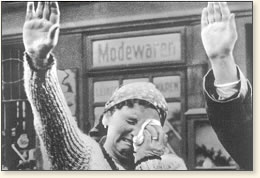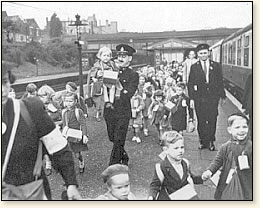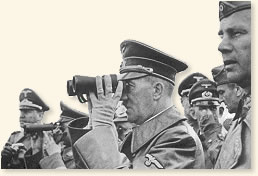|
The Beginning of World War II, 1939
Hitler's aggressive acquisition of territory began in 1936 when he ordered his army to reoccupy the Rhineland district of Germany. Bordering France, the Rhineland had been designated as a demilitarized zone by the Versailles Treaty ending World War I. It was a high-risk endeavor for Hitler. The German troops were unprepared, poorly equipped and had orders to retreat if the French offered any resistance. In the end, the maneuver went smoothly without any hindrance. Encouraged by this result, Hitler went on to absorb Austria and the German dominated Sudetenland area of Czechoslovakia into the German Third Reich in 1938. In March of the next year he occupied the remainder of Czechoslovakia
 |
Residents salute as Hitler
enters the Sudetenland, 1938 |
Bolstered by the tepid response of Britain and France to his earlier excursions, Hitler set
his sights on Poland. However, British Prime Minister Chamberlain had come
to the realization that Hitler's territorial ambitions could not be tempered
by submitting to his demands. In March 1939 he declared that Britain guaranteed
Poland's independence and vowed to come to her aid if attacked. France soon
joined Britain in support of Poland.
Hitler was undeterred. On August 23, 1939 he stunned the world with the announcement that he had signed a non-aggression treaty with the Soviet Union. The German Fuhrer was now assured that he could invade Poland without fear of Russian interference.
The assault was originally scheduled to begin in the early morning hours of August 26th. However, on August 25th, Britain announced that her guarantee of Polish independence had been formalized by an alliance between the two countries. Hitler wavered and postponed his attack to September 1.
The Germans concocted a story of Polish troops crossing their border and firing on various installations. In supposed retaliation, German tanks rolled across the Polish border during the early hours of September 1, 1939. Tensions were running high throughout Europe. Britain and France began mobilization of their armies while Italy's Mussolini desperately tried to intervene with Hitler to forestall war. The British and French representatives met with German Foreign Minister Ribbentrop warning that they would fulfill their obligation to Poland and go to war if German forces did not withdraw from Polish territory.
At 9:00 on the morning of September 3, Sir Neville Henderson, Britain's ambassador to Germany, delivered an ultimatum stating that if hostilities did not stop by 11 AM, a state of war would exist between Great Britain and Germany. Germany did not respond and at 11:15 on the morning of September 3, 1939 Prime Minister Neville Chamberlain went on the radio to announce to the British people that they were at war with Germany.
Paul Schmidt was a translator in the German Foreign Ministry and present at the history-making events of those last days of peace in Europe. The scene is the office of the German Foreign Ministry in Berlin. It is just after midnight on September 3, 1939 and the German juggernaut continues to slam its way into Poland. The Germans have not responded to an earlier British and French demand to withdraw their troops and a message is received stating that Sir Neville Henderson, the British Ambassador to Germany, wishes to meet with German Foreign Minister Ribbontrop. It is obvious to all that the Ambassador's message will probably mean war.
We join Schmidt's story as Ribbentrop decides that the translator should meet with the British ambassador alone:
"It was after midnight when the British Embassy telephoned to say that Henderson had received instructions from London to transmit a communication from his Government at 9 a.m., and that he asked to be received by Ribbentrop at the Foreign Office at that time. It was clear that this communication could contain nothing agreeable, and that it might possibly be a real ultimatum. Ribbentrop in consequence showed not the slightest inclination to receive the British Ambassador personally next morning. I happened to be standing near him.
'Really, you could receive the Ambassador in my place,' he said to me. 'Just ask the English whether that will suit them, and say that the Foreign Minister is not available at 9 o'clock.' The English agreed, and therefore I was instructed to receive Henderson next morning - that is, in five hours time, it being now 4 o'clock in the morning.
On Sunday, September 3rd, 1939, after the pressure of work over the last few days, I overslept, and had to take a taxi to the Foreign
 |
Children are evacuated from London
without their parents. September 1, 1939 |
Office. I could just see Henderson entering the building as I drove across the Wilhelmsplatz. I used a side entrance and stood in Ribbentrop's office ready to receive Henderson punctually at 9 o'clock. Henderson was announced as the hour struck. He came in looking very serious, shook hands, but declined my invitation to be seated, remaining solemnly standing in the middle of the room.
'I regret that on the instructions of my Government I have to hand you an ultimatum for the German Government,' he said with deep emotion, and then, both of us still standing up, he read out the British ultimatum. 'More than twenty-four hours have elapsed since an immediate reply was requested to the warning of September 1st, and since then the attacks on Poland have been intensified. If His Majesty's Government has not received satisfactory assurances of the cessation of all aggressive action against Poland, and the withdrawal of German troops from that country, by 11 o'clock British Summer Time, from that time a state of war will exist between Great Britain and Germany.'
When he had finished reading, Henderson handed me the ultimatum and bade me goodbye, saying: 'I am sincerely sorry that I must hand such a document to you in particular, as you have always been most anxious to help.'
I too expressed my regret, and added a few heartfelt words. I always had the highest regard for the British Ambassador.
I then took the ultimatum to the Chancellery, where everyone was anxiously awaiting me. Most of the members of the Cabinet and the leading men of the Party were collected in the room next to Hitler's office. There was something of a crush and I had difficulty in getting through to Hitler.
When I entered the next room Hitler was sitting at his desk and Ribbentrop stood by the window. Both looked up expectantly as I came in. I stopped at some distance from Hitler's desk, and then slowly translated the British Government's ultimatum. When I finished, there was complete silence.
Hitler sat immobile, gazing before him. He was not at a loss, as was afterwards stated, nor did he rage as others allege. He sat completely silent and unmoving.
 |
Hitler observes the destruction of Warsaw
October 1939
|
After an interval which seemed an age, he turned to Ribbentrop, who had remained standing by the window. 'What now?' asked Hitler with a savage look, as though implying that his Foreign Minister had misled him about England's probable reaction.
Ribbentrop answered quietly: 'I assume that the French will hand in a similar ultimatum within the hour.'
As my duty was now performed, I withdrew. To those in the anteroom pressing round me I said: 'The English have just handed us an ultimatum. In two hours a state of war will exist between England and Germany.' In the anteroom, too, this news was followed by complete silence.
Goering turned to me and said: 'If we lose this war, then God have mercy on us!' Goebbels stood in a corner, downcast and self-absorbed. Everywhere in the room I saw looks of grave concern, even amongst the lesser Party people."
References:
Schmidt, Paul, Hitler's Interpreter (1951); Shirer, William, The Rise and Fall of the Third Reich (1960); Taylor, A.J.P., The Origins of the Second World War (1962).
How To Cite This Article:
"The Beginning of World War II, 1939," EyeWitness to History, www.eyewitnesstohistory.com
(2004).
|






